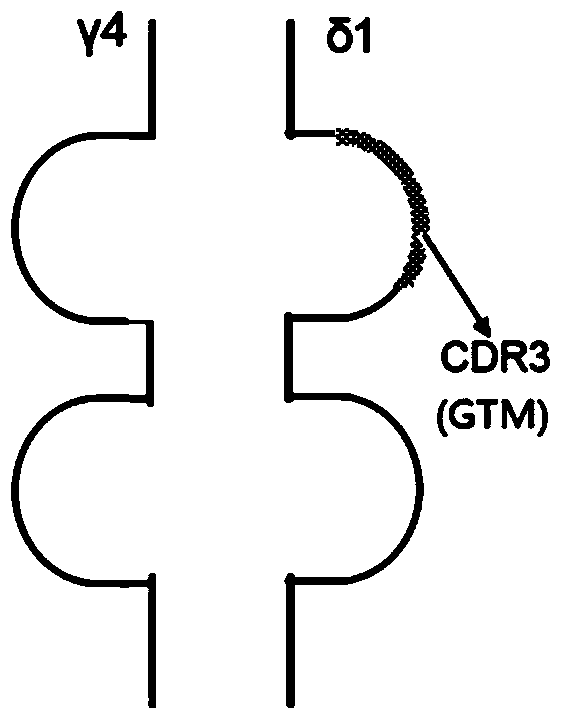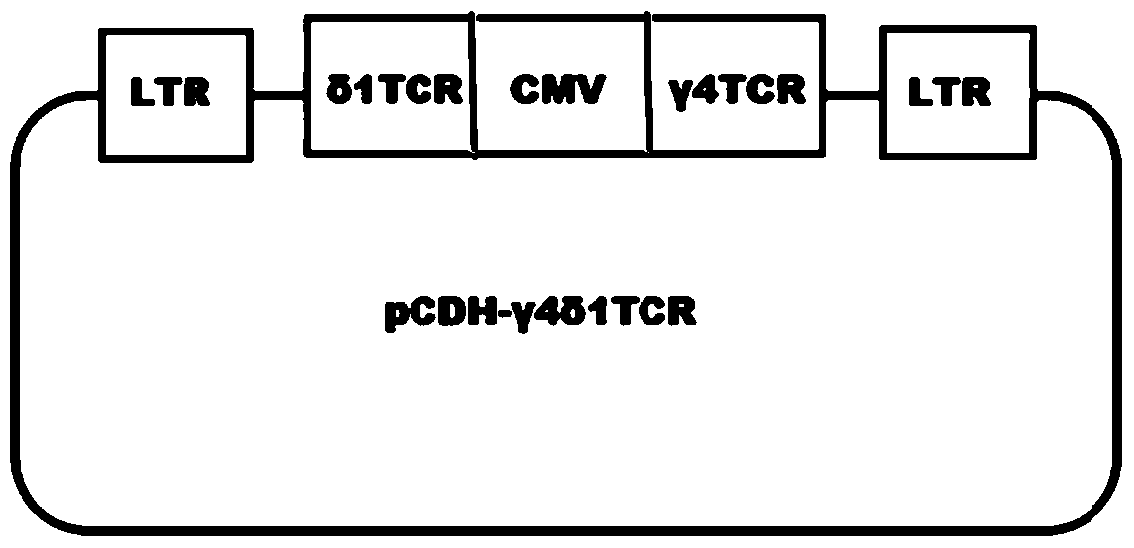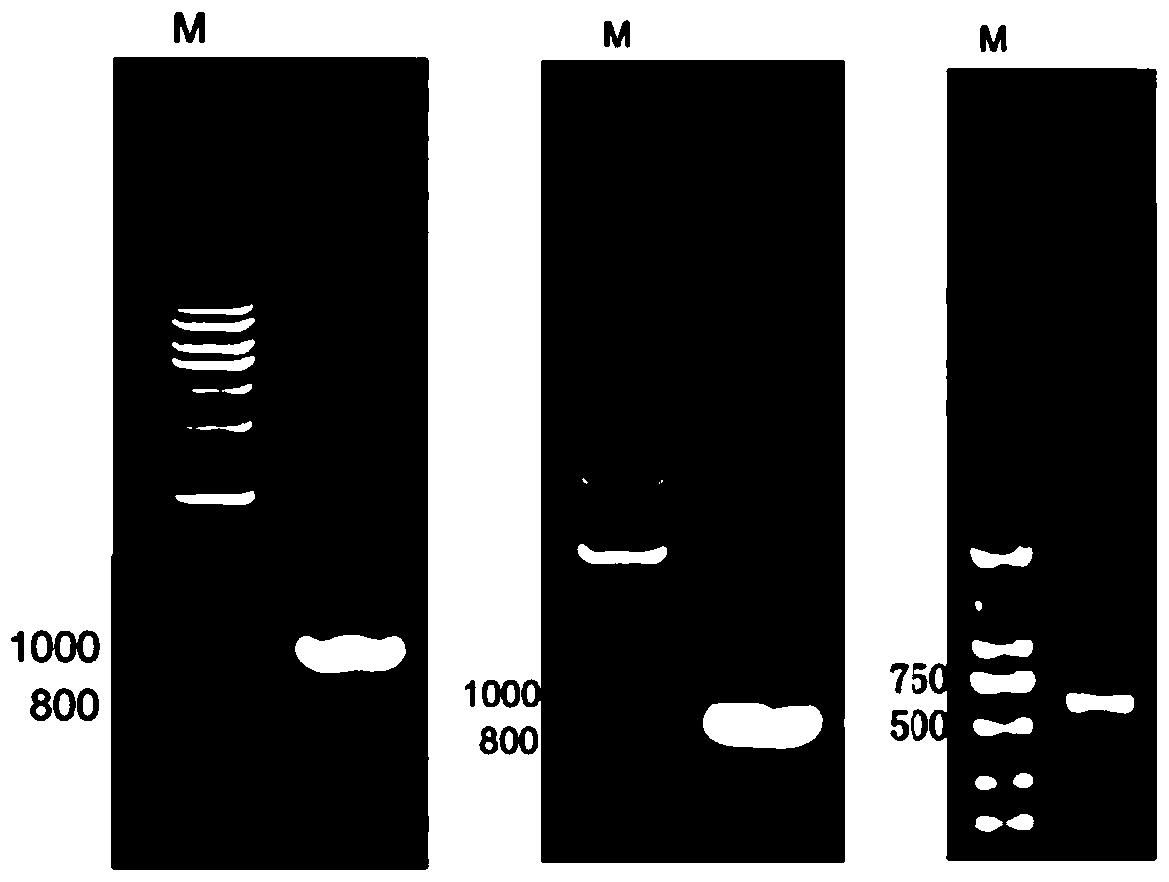Tumor binding specific γδtcr gene-modified αβt cells and its use for tumor suppression
A technology combining specificity and gene modification, which is applied in the field of adoptive immunotherapy of gene-modified lymphocytes, can solve the problems of low proportion of γδT cells, decreased number of γδT cells, decreased immune activity, etc., and achieve the best therapeutic effect
- Summary
- Abstract
- Description
- Claims
- Application Information
AI Technical Summary
Problems solved by technology
Method used
Image
Examples
Embodiment 1
[0092] Example 1: Construction of recombinant lentiviral vector pCDH-δ1TCR-CMV-γ4TCR
[0093] Since the GTM sequence has tumor binding specificity, the present invention puts it into the complete δ1 chain to replace the original CDR3δ sequence, and then combines with the complete γ4 chain to form a complete γ4δ1 (GTM) TCR molecule ( Figure 1A ), so that it is expressed on the surface of αβT cells. This γ4δ1 (GTM) TCR gene-modified αβT lymphocyte containing tumor-binding specific CDR3δ sequence (GTM) will have tumor-binding specificity similar to GTM, and can be used for tumor Adoptive immunotherapy.
[0094] In order to make the expression levels of exogenous γ4 chain and δ1 chain in αβT lymphocytes comparable, so as to successfully combine to form a complete γ4δ1 (GTM) TCR molecule, the present invention will complete the genes of γ4 chain and δ1 chain (CDR3δ sequence is GTM) The fragments were connected in series on a lentiviral vector, because the vector contained a CMV p...
Embodiment 2
[0096] Example 2: Recombinant lentiviral vector pCDH-δ1TCR-CMV-γ4TCR corresponding target protein γ4δ1 (GTM) TCR molecule expression detection
[0097] The recombinant lentiviral vector pCDH-δ1TCR-CMV-γ4TCR obtained in Example 1 was transferred into 293T cells, the expression of GFP was observed under a fluorescence microscope, the cells were collected, lysed, and the expression of δ1TCR in the whole cell lysate was detected by Western blotting. The result is as Figure 1E As shown, the mouse anti-human δ1 monoclonal antibody was used as the primary antibody, and the HRP enzyme-labeled goat anti-mouse antibody was used as the secondary antibody. Compared with the empty vector control, the δ1 TCR protein was well expressed in 293T cells. Furthermore, it was proved that γ4δ1(GTM) TCR molecules were expressed in 293T cells.
Embodiment 3
[0098]Example 3: Identification of lentivirus infection of αβT cells and expression of γ4δ1(GTM) TCR in αβT cells after infection
[0099] The recombinant lentiviral vector pCDH-δ1TCR-CMV-γ4TCR obtained in Example 1 was packaged as a recombinant lentivirus.
[0100] PBMCs from healthy people were isolated, αβT cells were sorted, and infected with the above-mentioned recombinant lentivirus in an environment stimulated and activated by a solid-phase anti-CD3 antibody. On the 7th day after infection, the cells were collected, and the expression of γ4δ1(GTM) TCR on their surface was detected by flow cytometry. Such as Figure 1F As shown, compared with the empty vector-infected control, 35.9% of αβT cells simultaneously expressed γ4δ1(GTM) TCR, that is, successfully obtained αβT cells expressing tumor-binding specific γδTCR gene modification, namely γ4δ1(GTM)-αβT cells.
PUM
 Login to View More
Login to View More Abstract
Description
Claims
Application Information
 Login to View More
Login to View More - R&D
- Intellectual Property
- Life Sciences
- Materials
- Tech Scout
- Unparalleled Data Quality
- Higher Quality Content
- 60% Fewer Hallucinations
Browse by: Latest US Patents, China's latest patents, Technical Efficacy Thesaurus, Application Domain, Technology Topic, Popular Technical Reports.
© 2025 PatSnap. All rights reserved.Legal|Privacy policy|Modern Slavery Act Transparency Statement|Sitemap|About US| Contact US: help@patsnap.com



